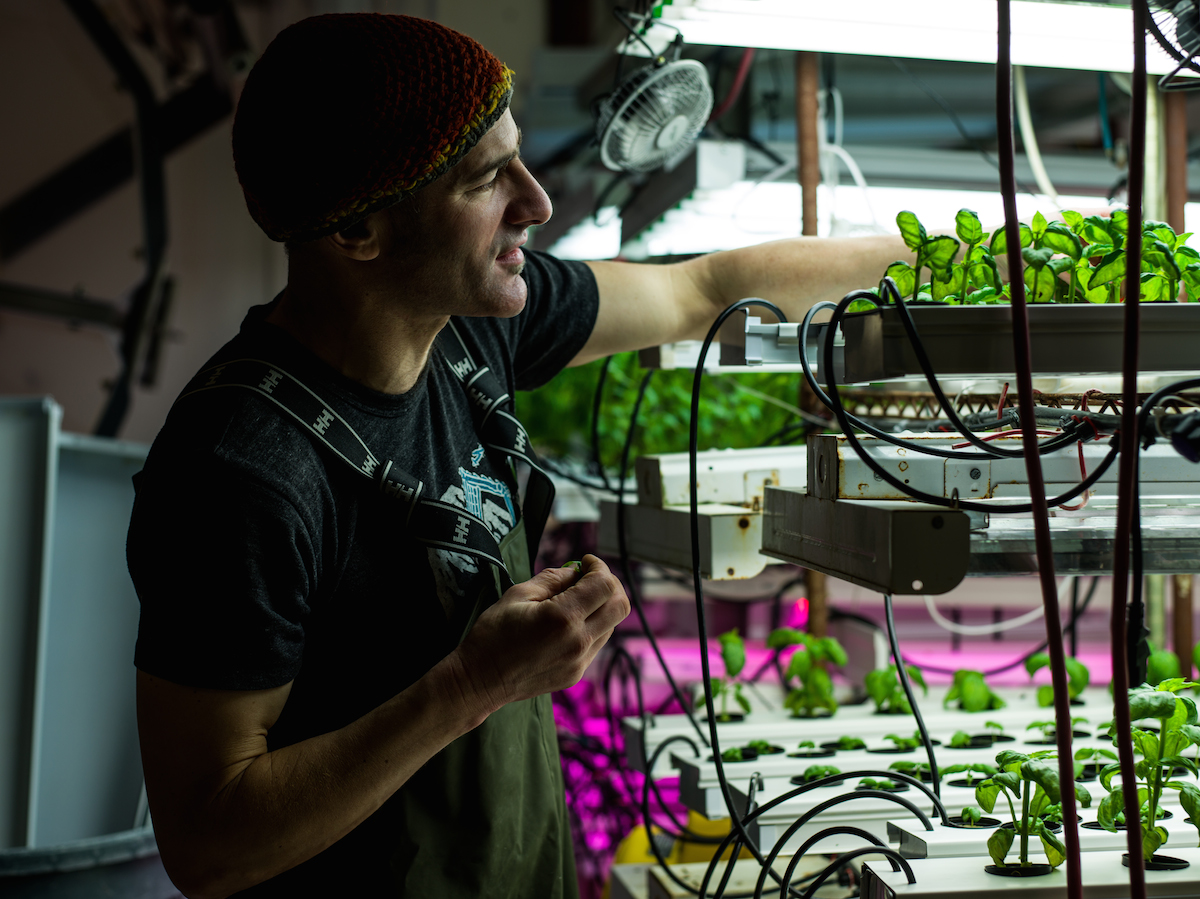Alaska Sprouts
Snow may still be melting in Anchorage, but in SJ Klein’s world right now, delicate green shoots spiral out of seeds, split into tender leaves, and reach toward the pull of white light.
This springtime process plays out every few weeks year-round in the controlled environment of Klein’s hydroponic microgreen farm. He has been operating an urban sprout farm for eight years and his business, Alaska Sprouts, now supplies most of the restaurants in Anchorage. Klein’s greens turn up in sushi rolls, sub sandwiches, bowls of pho, and atop seafood specials at high-end bistros.
“I guess we feed Anchorage. It’s not a deep niche, but it’s a big enough niche so we can do it,” he said.
The soilless indoor growing process of hydroponics relies on nutrient-rich water and artificial light. It is resource intensive, in particular because of the cost of electricity. It takes certain market conditions to make an operation pencil out, Klein stated. In Anchorage, a combination of the distance from outside producers, loyal local food enthusiasts, and a growing Asian demographic make it possible.
According to Klein, Alaska Sprouts has an edge over outside producers because of quality. Sprouts are delicate and shipping can damage or freeze them. He’s worked hard to develop a reputation of having a product that is reliably fresh and available.
“If you can supply people with what they need consistently, you’re going to grow,” Klein said. Alaska Sprouts grows 10 to 15 percent each year, he adds.
Klein’s acreage consists of stacks of carefully tended, illuminated trays, and large barrels for sprouting mung beans and clover, which require darkness.The biggest crop he grows are mung beans. The next largest are clover sandwich sprouts. He also grows daikon, onion, a sprouted three-bean mix, and a microgreen salad mix made of tiny kale, bok choy, and wasabi plants. Outside of restaurants, his products are at farmers markets and on the shelves at numerous Asian groceries, Carrs-Safeway locations, Red Apple Market, and Sagayas.
Sprout farming isn’t easy. Seeds are an agricultural product and can carry bacteria. Klein, who says he’s been a chemistry nerd since childhood, tests his sprouts for bacterial pathogens in a small lab every day. His growing facility must be kept obsessively clean.
“The whole goal is that people see our sprouts in the store and know that it’s safe,” Klein declared.
One of the attractions of sprouts for consumers is their concentrated nutritional value, he said. Broccoli sprouts, for example, have 250 times the antioxidants of mature broccoli.
“Pound for pound, sprouts just have more of it,” he said.
Klein, 46, didn’t plan to be a sprout farmer. He grew up in Anchorage and attended Harvard, studying political economics and international relations. He also went to school for brewing beer and, for a while, ran the Borealis Brewery. The beer venture failed, but taught him about business.
While selling beer, he struck up a friendship with Bernie Souphanavong, owner of Bernie’s Bar in downtown Anchorage. Souphanavong had been growing sprouts for years and was well connected in the city’s Asian communities. He saw a growing market for sprouts there.
“He knew there was a need 30 years ago,” Klein said. “The population for whom this food is a staple has grown.”
One in 10 people in Anchorage is Asian. The largest slice of this group has Filipino roots, followed by Koreans and Southeast Asians from Thailand, Laos and Vietnam. This demographic shift powered a boom in Asian restaurants and grocery stores and influenced the eating and cooking habits of the overall population, Klein explained.
“We’re in more places, more people are eating sprouts, and this pho thing has just taken off,” he added.
The key is experimenting while also paying careful attention to what consumers want. Some of Klein’s favorite products, like raw soy milk and pumpkin sprouts, were delicious but couldn’t gain a foothold in the market.
“The joy of entrepreneurship is doing something new and different and helping people discover it,” he said. “The skills it takes to do entrepreneurship to bring something new into the world are totally different than the skills needed to keep a business going.”
Klein has been happy to see successful hydroponic growers in rural Alaska communities like Kotzebue and St. Paul. Rural Alaska is ripe for hydroponics for some of the same reasons that his business has been successful in Anchorage.
“When you get that far out on the margins, the cost to produce isn’t too much more than the cost to ship it up, and the quality is much better,” Klein explained.
For years Klein operated his business out of a dog-eared warehouse in Spenard. But this spring, betting on the growing appreciation of local foods that has buoyed his business, he opened a new retail/manufacturing facility in a space shared with the ice cream company Wild Scoops and Alaska Pasta Company in Anchorage’s Fairview neighborhood. One of the challenges for small local food operations is the lack of space, he said. The shared location will be the city’s first local food retail/manufacturing location of its kind.
“The farmers markets have probably driven it more than anything else,” Klein said. “Farmers markets have really given people an opportunity to experiment, both with people making stuff and people trying new things.”
Elissa Brown, owner of Wild Scoops, first met Klein when she approached him to buy his hydroponic basil for her ice cream.
“I think a lot of the successful food companies rely on a network of other food set-ups,” she said. “It makes sense there would be a storefront like this where we are all right next to each other.”
Klein, she said, is a pioneer in local food production with a tested business model.
“He found a way to produce a fresh product year-round in Anchorage,” Brown marveled. “That’s impressive.”




